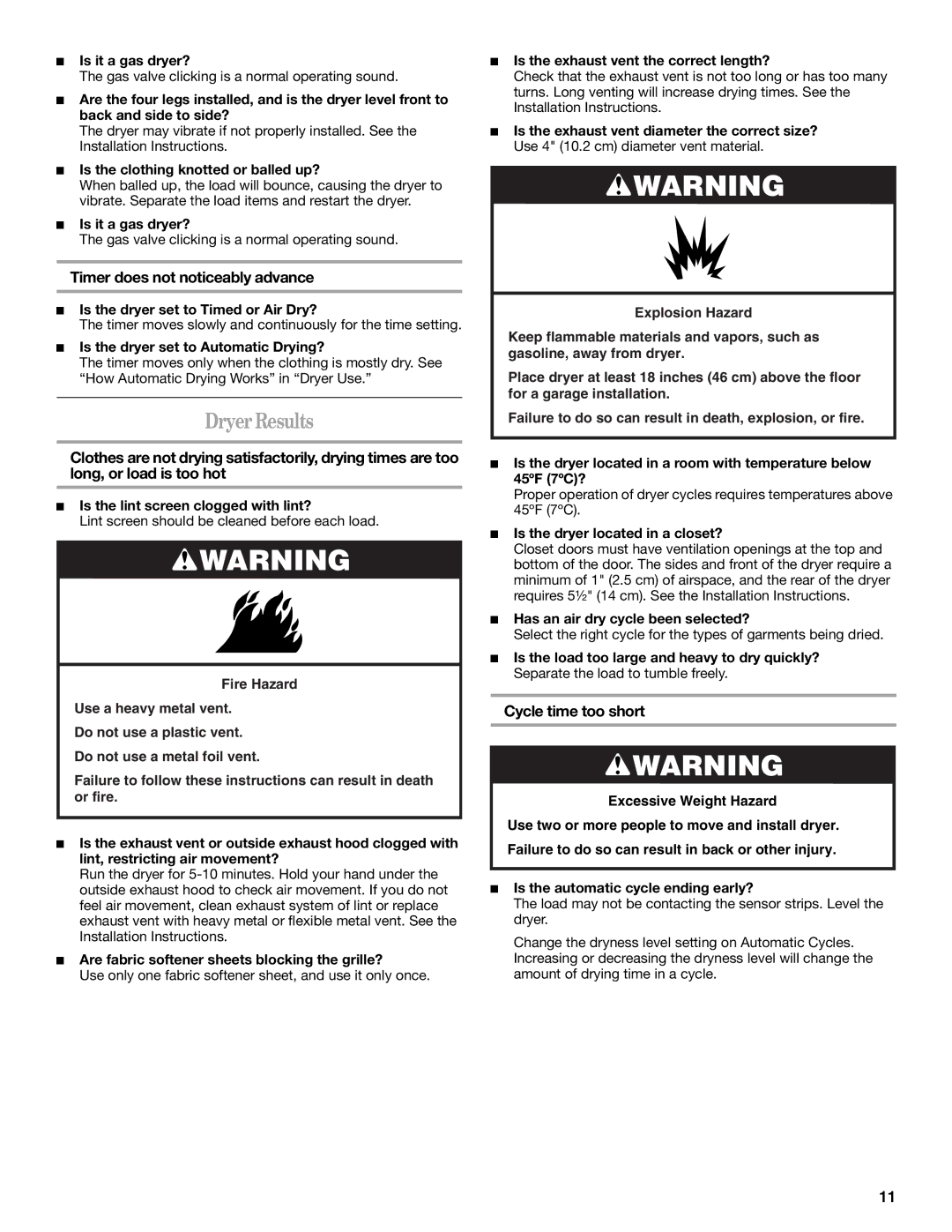
■Is it a gas dryer?
The gas valve clicking is a normal operating sound.
■Are the four legs installed, and is the dryer level front to back and side to side?
The dryer may vibrate if not properly installed. See the Installation Instructions.
■Is the clothing knotted or balled up?
When balled up, the load will bounce, causing the dryer to vibrate. Separate the load items and restart the dryer.
■Is it a gas dryer?
The gas valve clicking is a normal operating sound.
Timer does not noticeably advance
■Is the dryer set to Timed or Air Dry?
The timer moves slowly and continuously for the time setting.
■Is the dryer set to Automatic Drying?
The timer moves only when the clothing is mostly dry. See “How Automatic Drying Works” in “Dryer Use.”
Dryer Results
Clothes are not drying satisfactorily, drying times are too long, or load is too hot
■Is the lint screen clogged with lint?
Lint screen should be cleaned before each load.
![]() WARNING
WARNING
Fire Hazard
Use a heavy metal vent.
Do not use a plastic vent.
Do not use a metal foil vent.
Failure to follow these instructions can result in death or fire.
■Is the exhaust vent or outside exhaust hood clogged with lint, restricting air movement?
Run the dryer for
■Are fabric softener sheets blocking the grille?
Use only one fabric softener sheet, and use it only once.
■Is the exhaust vent the correct length?
Check that the exhaust vent is not too long or has too many turns. Long venting will increase drying times. See the Installation Instructions.
■Is the exhaust vent diameter the correct size? Use 4" (10.2 cm) diameter vent material.
![]() WARNING
WARNING
Explosion Hazard
Keep flammable materials and vapors, such as gasoline, away from dryer.
Place dryer at least 18 inches (46 cm) above the floor for a garage installation.
Failure to do so can result in death, explosion, or fire.
■Is the dryer located in a room with temperature below 45ºF (7ºC)?
Proper operation of dryer cycles requires temperatures above 45ºF (7ºC).
■Is the dryer located in a closet?
Closet doors must have ventilation openings at the top and bottom of the door. The sides and front of the dryer require a minimum of 1" (2.5 cm) of airspace, and the rear of the dryer requires 5½" (14 cm). See the Installation Instructions.
■Has an air dry cycle been selected?
Select the right cycle for the types of garments being dried.
■Is the load too large and heavy to dry quickly? Separate the load to tumble freely.
Cycle time too short
![]() WARNING
WARNING
Excessive Weight Hazard
Use two or more people to move and install dryer. Failure to do so can result in back or other injury.
■Is the automatic cycle ending early?
The load may not be contacting the sensor strips. Level the dryer.
Change the dryness level setting on Automatic Cycles. Increasing or decreasing the dryness level will change the amount of drying time in a cycle.
11
